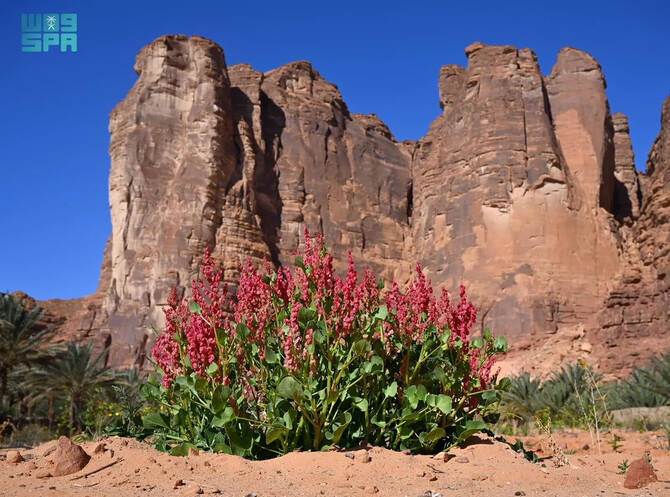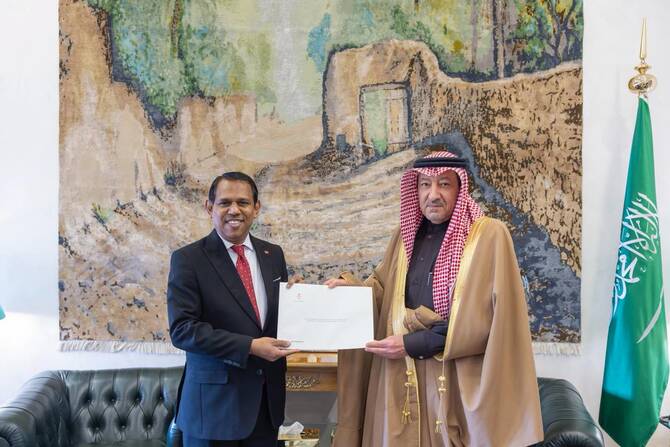JEDDAH: In the vast deserts of Saudi Arabia, a humble, yet remarkable, wildflower makes its mark each spring — Rumex vesicarius, known locally as hummayd.
Native to the Arabian Peninsula, this fast-growing plant thrives in sandy soils and plays a significant role in both the natural ecosystem and local culinary traditions.
“Hummayd is an annual herbaceous plant native to Saudi Arabia and widely distributed across its regions,” Arwa Alotaibi, a native plant researcher, told Arab News.

“Scientifically known as Rumex vesicarius, it belongs to the Polygonaceae family, commonly referred to as the dock or sorrel family.”
Hummayd is well adapted to desert conditions and is often found flourishing in arid environments. Its triangular green leaves and red or green flowers distinguish it from other wild plants. It typically grows to around half a meter in height and remains evergreen throughout its life cycle.
Due to its drought tolerance and minimal water requirements, hummayd is suited to Saudi Arabia’s harsh urban and desert climates, said Alotaibi.
“It is particularly abundant in the southern regions of the Kingdom, where rainfall is more consistent, followed by the Hijaz region, Najd, and the northern areas.”

Rumex vesicarius, known locally as hummayd, is an annual herbaceous plant native to Saudi Arabia and widely distributed across its regions. (SPA)
For generations, hummayd has held a special place in Saudi culinary traditions.
The plant can be eaten raw, with bread, or incorporated into tangy stews, Alotaibi said. In the Jazan region, it is especially prized for its unique acidic flavor.
“Rich in vitamin C, the plant aids digestion and helps reduce water retention, making it both flavorful and nutritious.”
Opinion
This section contains relevant reference points, placed in (Opinion field)
Its cultural relevance is captured in a well-known Saudi proverb: “Spring has arrived with the coming of hummayd,” signifying the plant’s role as a seasonal marker of renewal and abundance.
Beyond its culinary and cultural value, hummayd is also ecologically beneficial, serving as vegetative ground cover, helping to stabilize hillsides, rehabilitate degraded land, and enrich green open spaces.
“Its presence supports biodiversity in desert ecosystems, providing a food source for animals such as camels, sheep, and rabbits,” Alotaibi said.

It is a tough plant that grows well in sandy, dry areas with very little water. It can survive harsh desert conditions and still remain green. (SPA)
As such, with its resilience, versatility, and deep cultural roots, hummayd is more than just a wildflower — it is a symbol of spring, sustainability, and Saudi heritage.
During spring, the Kingdom bursts with a bouquet of delicately fragranced wildflowers, blanketing the normally sandy landscape with a beautiful color palette.
The typical blooming period starts from February to April, with slight variations depending on plant type and geographic elevation. Some flowers may bloom as early as January, especially in the warmer southern regions, while others in elevated areas flower later.
“Wildflowers bloom across Saudi Arabia each year, with blooming seasons varying by region depending on plant type and climate,” Joshua Van Alstine, Co Founder of The Saudi Arabian Botanical Society SABS, told Arab News.
“In general, wildflowers bloom during spring, especially after winter rains when temperatures become moderate and there is sufficient soil moisture.”

Humaid (Rumex vesicarius) is an edible wildflower that blooms in the Saudi desert during the spring. It is seen as a sign the season of growth and renewal has arrived. (SPA)
In the northern regions, areas such as Jouf experience a burst of wildflowers following winter rainfall, while in the southern highlands, areas such as Asir and Al-Baha, known for their cooler climate and high elevations, support a wide range of wildflower species.
Najran and Jazan also boast rich plant diversity, especially among the region’s deep valleys and high mountain areas.
Even in the Kingdom’s eastern and central deserts, wild desert flowers grow in sandy and wadi environments, typically after prolonged rainfall.
These plants are highly adapted to the harsh climate and require minimal water, making them an effective tool in combating desertification and restoring ecological balance.

It is a tough plant that grows well in sandy, dry areas with very little water. It can survive harsh desert conditions and still remain green. (SPA)
“Native plants contribute to biodiversity by providing natural habitats for various creatures, such as birds and bees,” said Joshua.
“Their value extends beyond the environment to include cultural and heritage dimensions, as they are traditionally used in folk medicine and decoration during social occasions, especially in regions such as Najran, Asir, and Jazan.
“Reviving this vegetation reflects a deep commitment to protecting nature, improving quality of life, reducing carbon emissions, and achieving net-zero goals.
“It also supports the creation of a more resilient and sustainable environment that secures natural resources and green spaces for future generations.”
DID YOU KNOW?
• Hummayd has triangular evergreen leaves and blooms in red or green flowers.
• It grows mostly in southern Saudi Arabia, but is found throughout the Kingdom.
• The plant is rich in vitamin C and aids digestion.
• It can be eaten raw, with bread, or cooked as a sour stew.
The preservation of local vegetation is closely linked to environmental sustainability, and is considered one of the main pillars of reforestation projects and the rehabilitation of degraded lands.
Indeed, these plants play a vital role in stabilizing soil, preventing erosion, enhancing rainwater absorption, and restoring soil fertility. In doing so, they support biodiversity by providing natural habitats for wildlife and contribute to ecosystem recovery and stability.
“In the face of relentless drought, blazing sun, and cold desert nights, they stand with quiet grace, unyielding, patient, and strong beyond measure,” Munira Alhazani, Founder and President of SABS, told Arab News.
“These resilient plants reflect our own journey, the emotions we carry, the challenges we face, and the courage that blossoms in our darkest moments.
“It is our passion, a steadfast love for life, that fuels our onward journey. Yet beneath this strength lies a fragile hope, a whisper of fear that in a fleeting moment of weakness, they might tire, fade, and quietly disappear.”

People in Saudi Arabia eat Humaid raw or cooked for its sour taste and health benefits. It can aid digestion and is rich in vitamin C. (SPA)
Efforts to protect the Kingdom’s wildflowers align closely with the goals of the Saudi Green Initiative and the Middle East Green Initiative.
The Saudi Green Initiative aims to plant 10 billion trees within the Kingdom and rehabilitate 40 million hectares of degraded land, while also improving air quality and reducing carbon emissions.
On a regional scale, the Middle East Green Initiative seeks to plant 50 billion trees, including 40 billion outside the Kingdom, in what is considered the largest reforestation project of its kind.
The initiative aims to combat desertification, reduce emissions, and enhance the quality of life throughout the region.
“Local vegetation plays a direct and foundational role in achieving the objectives of these national and regional initiatives, as well as in supporting Saudi Vision 2030 and the UN Sustainable Development Goals,” said Joshua.
“Through these efforts, the Kingdom affirms its pioneering role in environmental protection — locally and regionally — while striving to build a more sustainable future and ensure a better quality of life for future generations.”

















